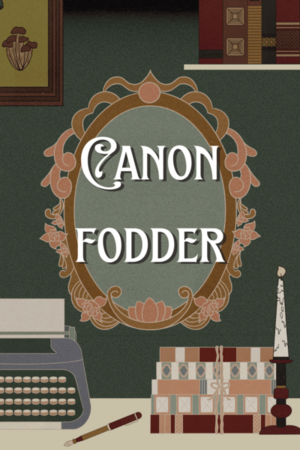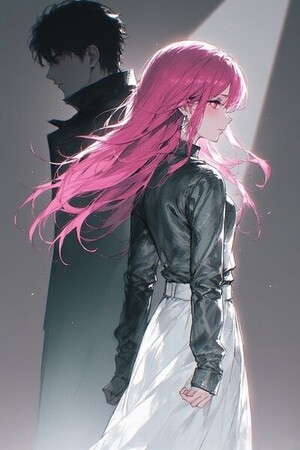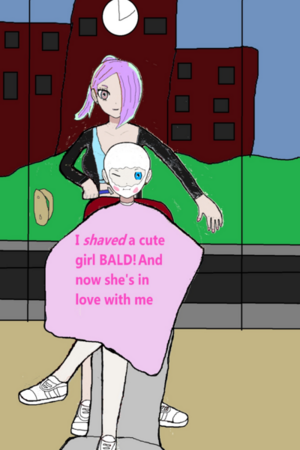Chapter 1:
girlfailure, interrupted
Canon Fodder: My Class is Just ‘Hater’!
Mariko only read Tower of Beasts: The Kingdom’s Castoff Turns Back Time and Builds His Legacy in Blood and Magic because it kept showing up in places it didn’t belong: on bestseller lists, in literary column roundups, and finally, tragically, on her editor’s desk.
It’s so subversive, one of the writers that she had previously admired had gushed in his column in the Monthly Literary Roundup. It examines the dark heart of the genre, masterfully evoking the tropes in a way that holds up a mirror to the reader’s own desires.
Another said:
What it lacks in style it makes up for in bold innovation; breathing much-needed fresh air into a market that has become inundated with formulae.
Which was, in Mariko’s opinion, psychotic praise to give something that didn’t even try pretending it was more than a wish-fulfillment gorefest.
Tower of Beasts: The Kingdom’s Castoff Blah Blah Blah was a power fantasy. It was a sprawling tower-style death game with RPG mechanics, a chuuni grimdark moral system, and a hero whose only nerf was having to pause aura farming long enough to go and seduce one harem member or another.
At least, that’s what the later volumes looked like.
What it started as was something else entirely.
The lead, Rion Starfall, was a war orphan picked off the streets and sent into the Tower as fodder, a meat shield for noble kids in his city. He played into the pure-hearted country boy archetype well, trying to believe in the goodness of others, that all humans were inherently kind. Shorthand for the biggest naivest loser that ever had the misfortune of being the protagonist of a revenge porn novel. You get the gist.
His short life was a clown car of humiliation, magical trauma, abuse, and repeated betrayals; he was god’s favorite punching bag. Beasts broke out of thousand-year-seals to kick his ass on a daily basis. He gets betrayed enough times that Mariko cheers and chugs her wine every time a soft-spoken young maiden stabs him in the back. He internalizes each and every betrayal as a personal failing, a reason he couldn’t be trusted, and keeps going, trusting that the wish that he's granted at the top of the tower will finally make people love him. It’s bleak as hell.
But! Despite all that, pure of heart and soft of brain, he ascends to the top of the tower, with only two companions in tow: two women who symbolically struggle for the fate of his heart. When the very transparently evil one betrays him at the very last second, his childhood friend magically and tragically sacrifices herself and falls from the tower. And as the skies open up and the gods ask what Rion wishes for, he says, simply, I wish I could have done it better.
This final wish turns the rest of the story deeply unserious.
In the next volume, he wakes up five years earlier, and the whole world is butter for his sword, Oathbreaker, to cut through. His heart is hardened, and no longer comes to tears at every sob story he hears; conversely, the world itself responds enthusiastically to this new Rion who gazes at damsels with nothing more than resigned apathy. To go with his new borderline depression he also has a cheat skill, an inversion of his first pathetic life’s strong morals: for every being that he betrayed before they betrayed him, both his strength and charisma stats would grow. The less he cared about people, the more they adored him. It was brainless revenge fantasy, and there were fifteen boobarrific volumes of it.
And yet.
And yet.
There had been something almost beautiful in the first few volumes’ sincerity. Something uniquely pathetic in the unending tragedy of a boy who just kept getting up when the world kicked the shit out of him over and over.
From Mariko’s notes:
The author’s obsession with styling the story after Miura’s grimmest visions for Berserk aside, the first iteration of the story plays out with some semblance of earnestness, almost poetry in how hard the author commits to making this poor kid’s life miserable.
Until, of course, the OP-ness of Rion’s post-regression cheat skill makes the emotional friction of the first volumes negligible, and, in the absence of the conga line of betrayals and constantly being beast chow, the story becomes a stand-in for more mundane fantasies, like having five hundred girlfriends and having the biggest conflict be who the best girl was. Mariko’s money was on foot fetish girl.
She didn’t get her PhD for this shit.
Take, for example, this tasty morsel that she stumbles upon during a late night of unhappy reading:
Why are you always like this?” he whispered brokenly, hugging her as tightly as his arms would allow. “Why do you still cry... for trash like me?” His eyes burned. His soul screamed. The dungeon around them faded away, and all that was left was her sobs, his arms, and the unbearable ache of love too late.
Nope. Nope nope nope--
She shoves her chair back and heads for the kitchen.
Outside, the cicadas are getting louder. She doesn’t turn the lights on as she pads towards the fridge, tracing patterns on the dust gathering on the furniture with her fingers.
This house was too fucking big for her. She should probably sell it.
All her mother’s wine glasses are too fancy, so she pours herself wine into her mug. Backlit by the glow of the fridge, she can see the pale outlines on the bookshelves where her mother took out books to lend to her friends and never got them back.
The air is warm, sticking to her skin. She leans against the counter and closes her eyes. With the cicadas, and the AC, and the occasional car slipping past on the road outside, the house isn’t as deathly quiet as she’d been afraid of. If she keeps listening, she’d hear it: the lights flicking on, and her mother’s voice, Mariko, what on earth are you doing up so late?, her tone soft and amused.
She slams her mug on the counter, and refills it.
Then she goes back into her room, where it’s bright, and the dorky mechanical keyboard her editor gifted her is waiting.
The tension leaves her with a sigh. She's about to start working on the first draft when her phone pings with an email:
From: Yamaguchi-san
Subject: Reminder: Review Due
This is the fourth nudge. You always go viral, so anything works! Just talk about the magic system or something if the prose is bad. We just need something right now.
Please just send anything.
She swigs her whole mug of wine. Then she leaves and brings back the whole bottle.
Her virality is a curse she bears with heavy grief. It happened out of nowhere: a quote from her 14,000 word review of Falling into the Demon King’s Bed (and His Heart!) got reposted by a K-pop fancam account with the caption:
“she ate. i fear literature is back.”
Literature wasn’t back! That was the whole point! But she has a following now, a cursed little substack that got picked up by aggregator sites with names like OtakuMind. Her students refer to her as “the anime one,” and her colleagues—as far as they acknowledged her existence—assume she’s an online essayist first and academic second.
She’s not. She’s a junior adjunct professor at a mid-tier university whose office had a leak and a mouse. She had three course preps, a department chair who thought women couldn’t write about robots, and an inbox full of review requests she didn’t remember agreeing to.
When she comes out of a fugue state of typing, her first draft is some of her greatest work yet:
A few volumes of genuine narrative gravity that flinches before it realizes its potential, creating that monster of modern publishing: the hero that stands for nothing but his readerbase’s will. The reset-button fanservice is more offensive than a story that claimed to be nothing more than what it was, and the harem is as overbloated as the metaphors are.
She doesn’t hear back after sending it to her editor, not for hours. Then:
From: Yamaguchi-san
Subject: Draft Received
What’s gotten into you?
I asked for a soft touch. This was a collaborative feature! I told you, there’s a promotional deal. For now, put aside your indignation at what it could have been and structure it around what people like. We need to sound relatable. Anything.
Relatable schematable. She pours herself another glass and gets to work on an even nastier version, which gets rejected before she can even refresh her inbox.
Well. Now he's just being rude. She types some more.
The next morning, as a last-ditch attempt to make her stop emailing him increasingly cutting versions about the critique industry turning into a breeding ground for sycophants, her editor forwards her something “more her speed”. It’s a novel by a Naoki Prize–winning author that she was a fan of previously, but this time she finds herself scrolling through the PDF listlessly. It’s a lot of the same stuff she always seems to read. Quiet grief. A metaphor about bees. Delicate horniness, in that tasteful woman author kind of way.
As she gets out of the train to the university, Mariko closes the attachment and goes back to her drafts. There’s something unfinished that's stuck like a burr in a corner of her mind, and to get it out she keeps working on her counter-essay on her phone.
“The logical and narrative conclusion to this story is Rion finally finding peace in death, but the author’s agent got a call from MAPPA and they wrote 5 filler arcs of fanservice and also Rion’s sword is bigger now,” she typed.
Which. Okay, maybe not the most objective criticism she’s ever given. Backspace, backspace, backspace. Maybe she should start with outlining chapter references, footnotes, a comparative structure graph—
A horn. People yelling. Something blares. Huh. When had she started crossing the road?
Oh, she thinks, blinking at the truck that's barrelling towards her. That’s a pretty shitty plot device.
Then she's airborne.




Please sign in to leave a comment.